仁爱科普版英语八年级下册Unit 7 Food festival Topic 2同步练习(含解析)
文档属性
| 名称 | 仁爱科普版英语八年级下册Unit 7 Food festival Topic 2同步练习(含解析) |
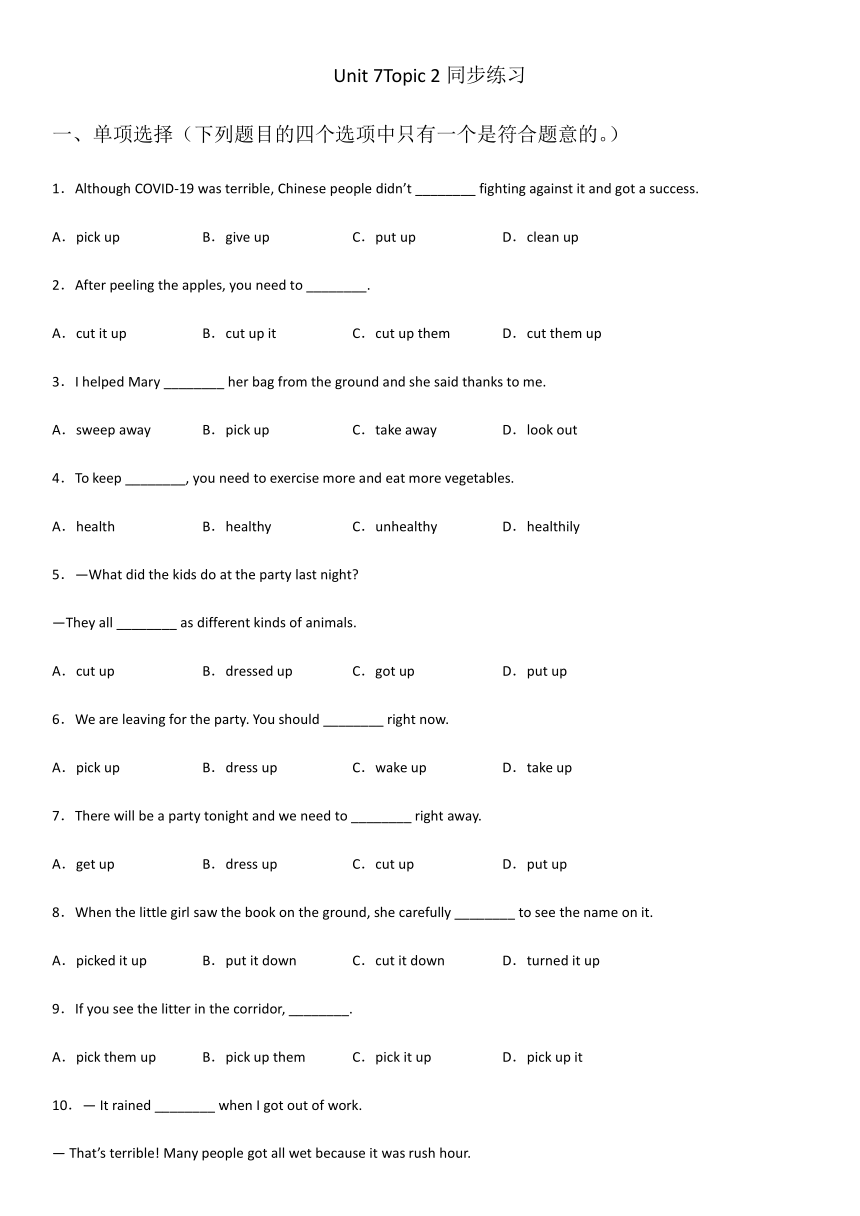
|
|
| 格式 | docx | ||
| 文件大小 | 95.0KB | ||
| 资源类型 | 教案 | ||
| 版本资源 | 仁爱科普版 | ||
| 科目 | 英语 | ||
| 更新时间 | 2023-01-01 21:29:41 | ||
图片预览

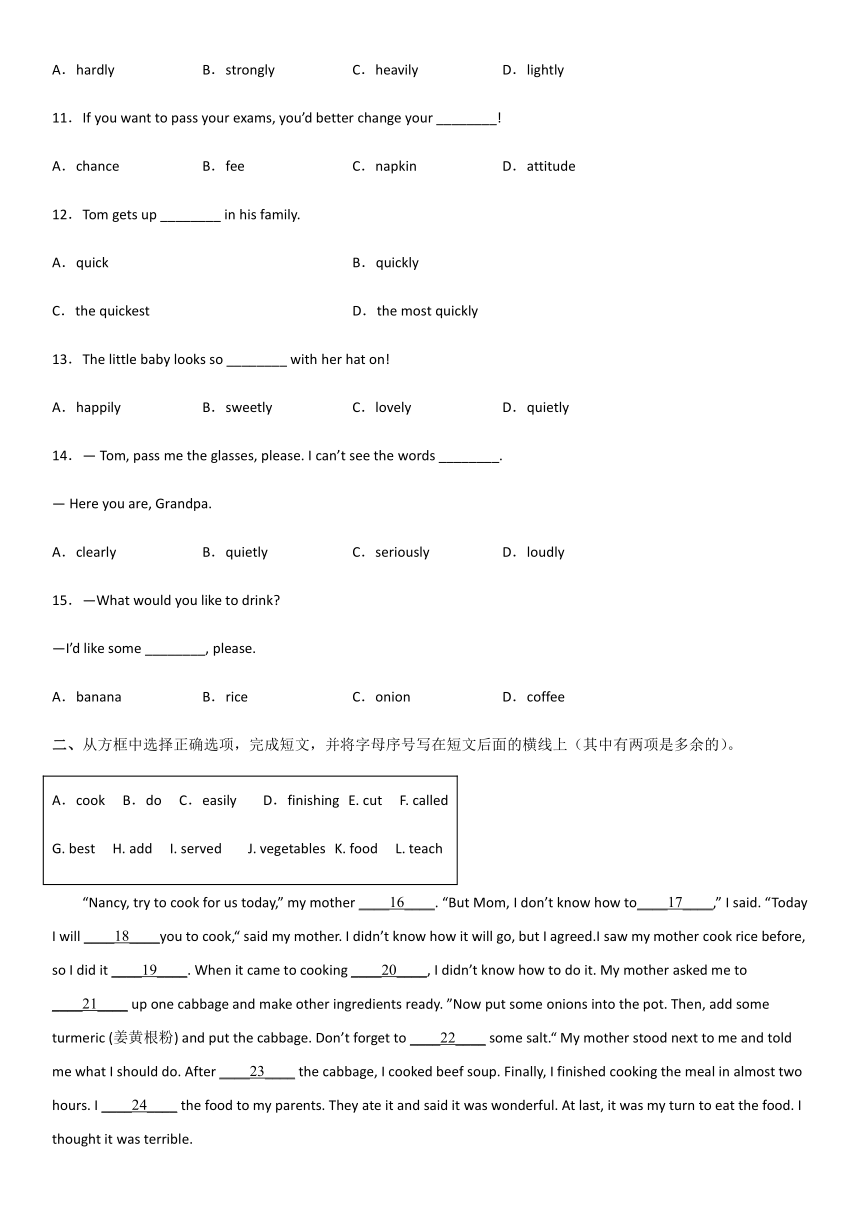
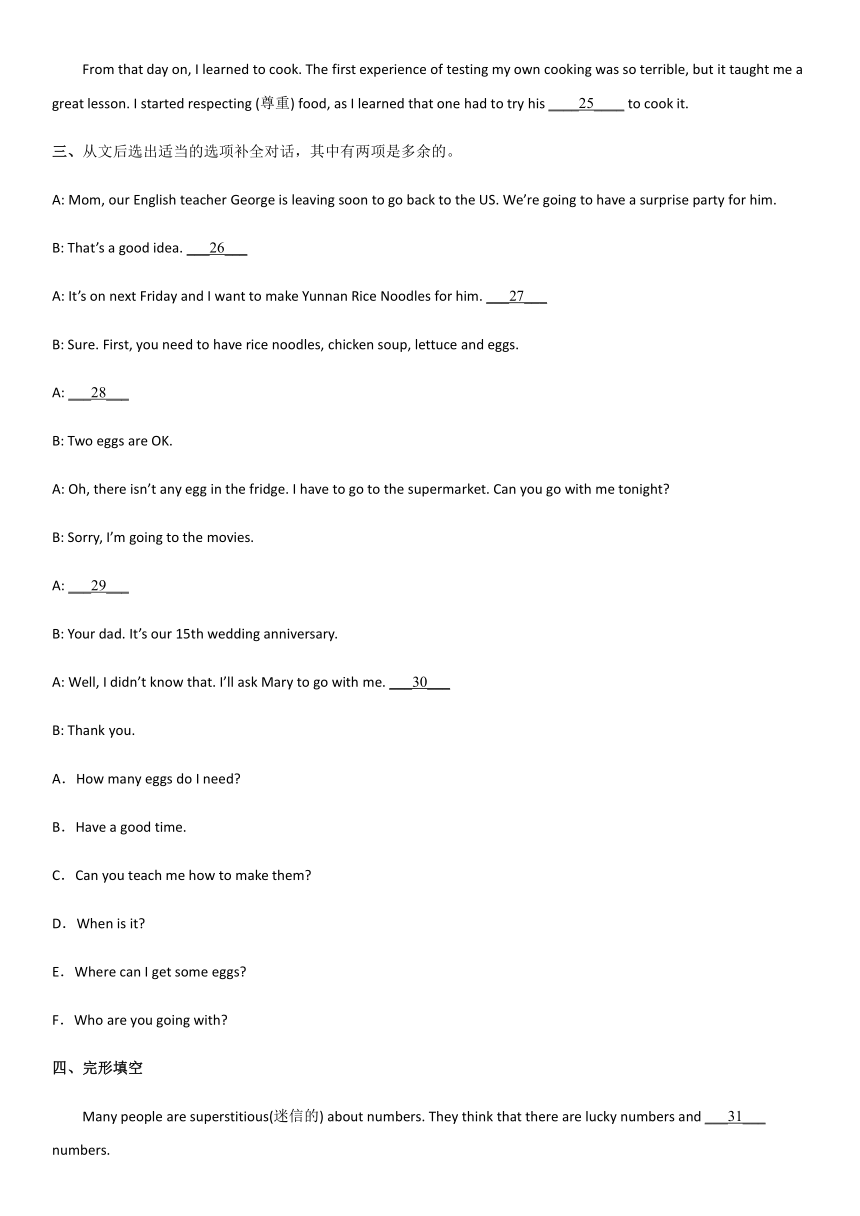
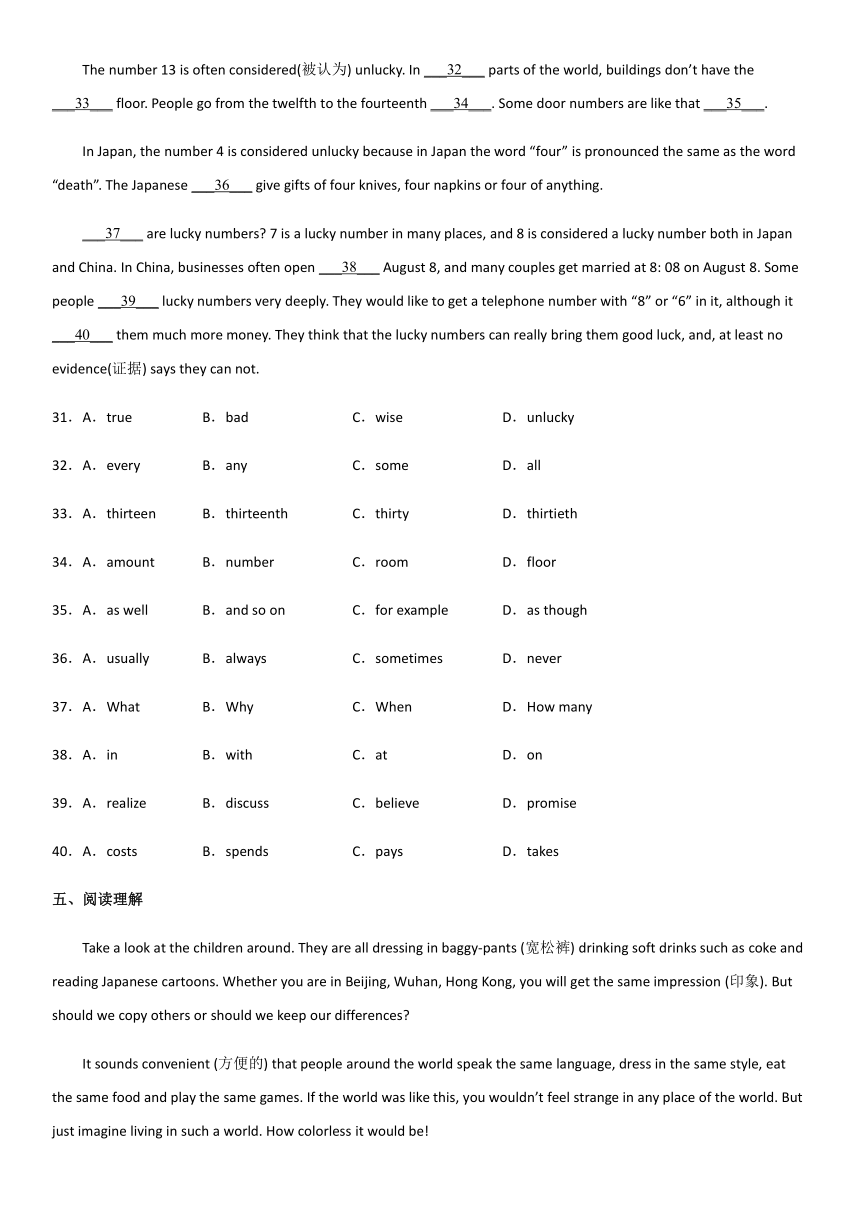
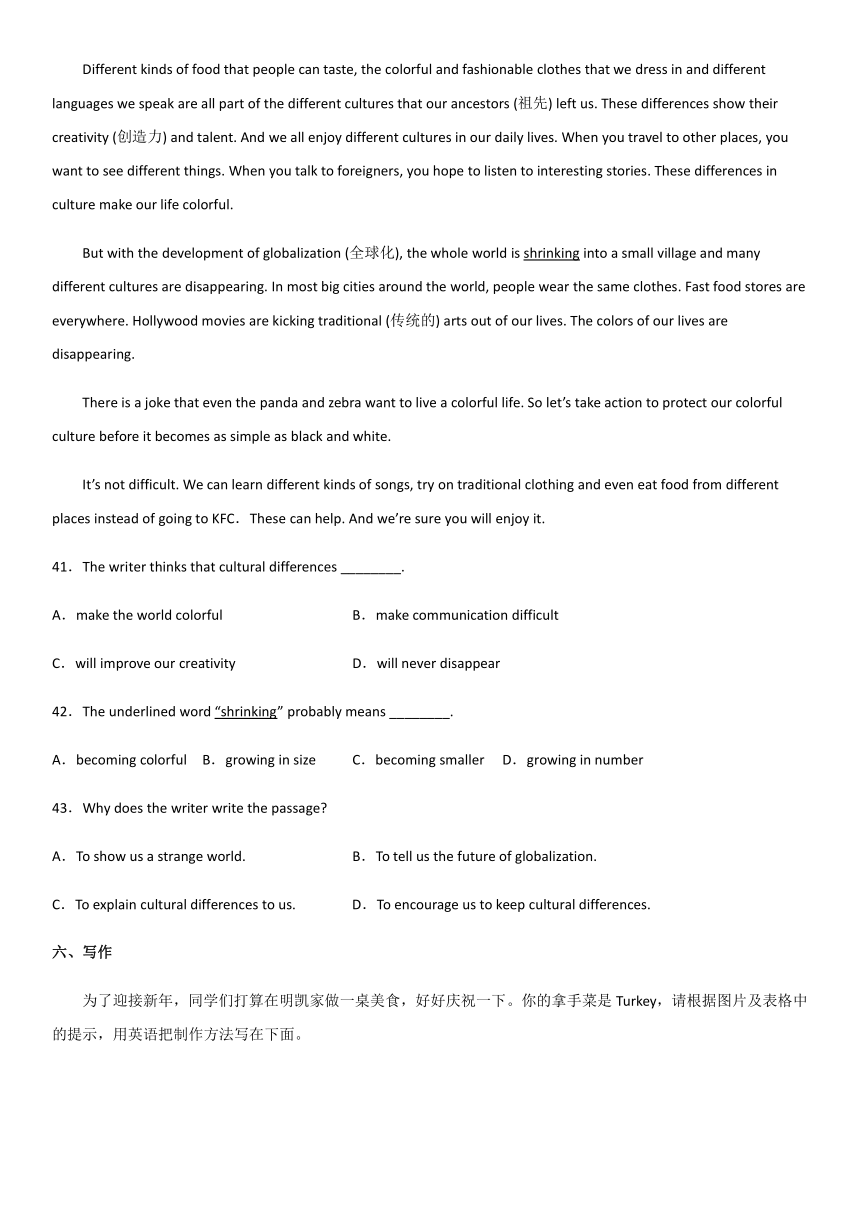
文档简介
Unit 7Topic 2同步练习
一、单项选择(下列题目的四个选项中只有一个是符合题意的。)
1.Although COVID-19 was terrible, Chinese people didn’t ________ fighting against it and got a success.
A.pick up B.give up C.put up D.clean up
2.After peeling the apples, you need to ________.
A.cut it up B.cut up it C.cut up them D.cut them up
3.I helped Mary ________ her bag from the ground and she said thanks to me.
A.sweep away B.pick up C.take away D.look out
4.To keep ________, you need to exercise more and eat more vegetables.
A.health B.healthy C.unhealthy D.healthily
5.—What did the kids do at the party last night
—They all ________ as different kinds of animals.
A.cut up B.dressed up C.got up D.put up
6.We are leaving for the party. You should ________ right now.
A.pick up B.dress up C.wake up D.take up
7.There will be a party tonight and we need to ________ right away.
A.get up B.dress up C.cut up D.put up
8.When the little girl saw the book on the ground, she carefully ________ to see the name on it.
A.picked it up B.put it down C.cut it down D.turned it up
9.If you see the litter in the corridor, ________.
A.pick them up B.pick up them C.pick it up D.pick up it
10.— It rained ________ when I got out of work.
— That’s terrible! Many people got all wet because it was rush hour.
A.hardly B.strongly C.heavily D.lightly
11.If you want to pass your exams, you’d better change your ________!
A.chance B.fee C.napkin D.attitude
12.Tom gets up ________ in his family.
A.quick B.quickly
C.the quickest D.the most quickly
13.The little baby looks so ________ with her hat on!
A.happily B.sweetly C.lovely D.quietly
14.— Tom, pass me the glasses, please. I can’t see the words ________.
— Here you are, Grandpa.
A.clearly B.quietly C.seriously D.loudly
15.—What would you like to drink
—I’d like some ________, please.
A.banana B.rice C.onion D.coffee
二、从方框中选择正确选项,完成短文,并将字母序号写在短文后面的横线上(其中有两项是多余的)。
A.cook B.do C.easily D.finishing E. cut F. called G. best H. add I. served J. vegetables K. food L. teach
“Nancy, try to cook for us today,” my mother ____16____. “But Mom, I don’t know how to____17____,” I said. “Today I will ____18____you to cook,“ said my mother. I didn’t know how it will go, but I agreed.I saw my mother cook rice before, so I did it ____19____. When it came to cooking ____20____, I didn’t know how to do it. My mother asked me to ____21____ up one cabbage and make other ingredients ready. ”Now put some onions into the pot. Then, add some turmeric (姜黄根粉) and put the cabbage. Don’t forget to ____22____ some salt.“ My mother stood next to me and told me what I should do. After ____23____ the cabbage, I cooked beef soup. Finally, I finished cooking the meal in almost two hours. I ____24____ the food to my parents. They ate it and said it was wonderful. At last, it was my turn to eat the food. I thought it was terrible.
From that day on, I learned to cook. The first experience of testing my own cooking was so terrible, but it taught me a great lesson. I started respecting (尊重) food, as I learned that one had to try his ____25____ to cook it.
三、从文后选出适当的选项补全对话,其中有两项是多余的。
A: Mom, our English teacher George is leaving soon to go back to the US. We’re going to have a surprise party for him.
B: That’s a good idea. ___26___
A: It’s on next Friday and I want to make Yunnan Rice Noodles for him. ___27___
B: Sure. First, you need to have rice noodles, chicken soup, lettuce and eggs.
A: ___28___
B: Two eggs are OK.
A: Oh, there isn’t any egg in the fridge. I have to go to the supermarket. Can you go with me tonight
B: Sorry, I’m going to the movies.
A: ___29___
B: Your dad. It’s our 15th wedding anniversary.
A: Well, I didn’t know that. I’ll ask Mary to go with me. ___30___
B: Thank you.
A.How many eggs do I need
B.Have a good time.
C.Can you teach me how to make them
D.When is it
E.Where can I get some eggs
F.Who are you going with
四、完形填空
Many people are superstitious(迷信的) about numbers. They think that there are lucky numbers and ___31___ numbers.
The number 13 is often considered(被认为) unlucky. In ___32___ parts of the world, buildings don’t have the ___33___ floor. People go from the twelfth to the fourteenth ___34___. Some door numbers are like that ___35___.
In Japan, the number 4 is considered unlucky because in Japan the word “four” is pronounced the same as the word “death”. The Japanese ___36___ give gifts of four knives, four napkins or four of anything.
___37___ are lucky numbers 7 is a lucky number in many places, and 8 is considered a lucky number both in Japan and China. In China, businesses often open ___38___ August 8, and many couples get married at 8: 08 on August 8. Some people ___39___ lucky numbers very deeply. They would like to get a telephone number with “8” or “6” in it, although it ___40___ them much more money. They think that the lucky numbers can really bring them good luck, and, at least no evidence(证据) says they can not.
31.A.true B.bad C.wise D.unlucky
32.A.every B.any C.some D.all
33.A.thirteen B.thirteenth C.thirty D.thirtieth
34.A.amount B.number C.room D.floor
35.A.as well B.and so on C.for example D.as though
36.A.usually B.always C.sometimes D.never
37.A.What B.Why C.When D.How many
38.A.in B.with C.at D.on
39.A.realize B.discuss C.believe D.promise
40.A.costs B.spends C.pays D.takes
五、阅读理解
Take a look at the children around. They are all dressing in baggy-pants (宽松裤) drinking soft drinks such as coke and reading Japanese cartoons. Whether you are in Beijing, Wuhan, Hong Kong, you will get the same impression (印象). But should we copy others or should we keep our differences
It sounds convenient (方便的) that people around the world speak the same language, dress in the same style, eat the same food and play the same games. If the world was like this, you wouldn’t feel strange in any place of the world. But just imagine living in such a world. How colorless it would be!
Different kinds of food that people can taste, the colorful and fashionable clothes that we dress in and different languages we speak are all part of the different cultures that our ancestors (祖先) left us. These differences show their creativity (创造力) and talent. And we all enjoy different cultures in our daily lives. When you travel to other places, you want to see different things. When you talk to foreigners, you hope to listen to interesting stories. These differences in culture make our life colorful.
But with the development of globalization (全球化), the whole world is shrinking into a small village and many different cultures are disappearing. In most big cities around the world, people wear the same clothes. Fast food stores are everywhere. Hollywood movies are kicking traditional (传统的) arts out of our lives. The colors of our lives are disappearing.
There is a joke that even the panda and zebra want to live a colorful life. So let’s take action to protect our colorful culture before it becomes as simple as black and white.
It’s not difficult. We can learn different kinds of songs, try on traditional clothing and even eat food from different places instead of going to KFC.These can help. And we’re sure you will enjoy it.
41.The writer thinks that cultural differences ________.
A.make the world colorful B.make communication difficult
C.will improve our creativity D.will never disappear
42.The underlined word “shrinking” probably means ________.
A.becoming colorful B.growing in size C.becoming smaller D.growing in number
43.Why does the writer write the passage
A.To show us a strange world. B.To tell us the future of globalization.
C.To explain cultural differences to us. D.To encourage us to keep cultural differences.
六、写作
为了迎接新年,同学们打算在明凯家做一桌美食,好好庆祝一下。你的拿手菜是Turkey,请根据图片及表格中的提示,用英语把制作方法写在下面。
Ingredient (食材) bread, onion, turkey, meat, carrots, potatoes
Flavoring (调料) salt, pepper, gravy
Tool (工具) oven, plate, knife
要求:1. 字迹工整,语法正确;2. 不少于5句话,40词以上。
________________________________________________________________________________________________________________________________________________________________________________________________________________________________________________________________________________________________________________________________________
参考答案
1.B
【解析】句意:尽管新冠肺炎疫情很可怕,但中国人民没有放弃与之斗争并取得了成功。
考查动词短语。pick up捡起;give up放弃;put up张贴;clean up清理。根据“Although COVID-19 was terrible, Chinese people didn’t...fighting against it and got a success.”可知虽然新冠肺炎疫情很可怕,但中国人民没有放弃战胜病魔并取得了成功。故选B。
2.D
【解析】句意:苹果去皮后,你需要把它们切碎。
考查代词辨析及位置。it它;them它们。根据“After peeling the apples”可知,空格处代词用“them”,代词应置于动词短语中间,故选D。
3.B
【解析】句意:我帮玛丽从地上捡起她的包,她对我说了声谢谢。
考查动词短语辨析。sweep away清除;pick up拾起;take away带走;look out小心。根据“I helped Mary …her bag from the ground”可知,帮她拾起地上的包,故选B。
4.B
【解析】句意:为了保持健康,你需要多锻炼,并且多吃蔬菜。
考查词义辨析。health健康,名词;healthy健康的,形容词;unhealthy不健康的,形容词;healthily健康地,副词。根据“you need to exercise more and eat more vegetables”可知,多锻炼、多吃蔬菜是为了保持健康,keep healthy“保持健康”。故选B。
5.B
【解析】句意:——孩子们昨晚在聚会上做了什么?——他们都打扮成不同种类的动物。
考查动词短语。cut up切碎;dress up装扮;get up起床;put up张贴。根据“They all...as different kinds of animals”可知孩子们装扮成不同的动物,dress up as“装扮成”。故选B。
6.B
【解析】句意:我们要去参加聚会了。你现在应该打扮一下。
考查动词短语。pick up捡起;dress up打扮;wake up醒来;take up占据。根据“We are leaving for the party.”可知要去参加聚会,需要打扮下。故选B。
7.B
【解析】句意:今晚有个晚会,我们得马上盛装打扮。
考查动词短语辨析。get up起床;dress up打扮;cut up切碎;put up张贴。根据“There will be a party tonight and we need to”可知,需要盛装打扮去参加派对,故选B。
8.A
【解析】句意:当小女孩看到地上的书时,她小心翼翼地把它捡起来,看上面的名字。
考查动词短语。pick up捡起;put down放下;cut down砍倒;turn up出现。根据“she book on the ground”可知是捡起地上的书,故选A。
9.C
【解析】句意:如果你在走廊看到垃圾,把它捡起来。
考查动词短语和代词位置。pick...up表示“捡起”,it指代the litter,动词短语是“动词+副词”,代词需放到中间。故选C。
10.C
【解析】句意:——我下班的时候,雨下得很大。——真糟糕!因为是高峰时间,很多人都湿透了。
考查副词辨析。hardly几乎不;strongly强烈地;heavily重地,大量地;lightly轻轻地。根据“Many people got all wet”可知,雨下得很大,故选C。
11.D
【解析】句意:如果你想通过考试,你最好改变你的态度!
考查名词。chance机会;fee费用;napkin餐巾纸;attitude态度。根据“If you want to pass your exams”可知,你想要通过考试,应该改变你的态度,故选D。
12.D
【解析】句意:汤姆是他们家起床最快的。
考查副词最高级。quick快的,形容词;quickly快地,副词;the quickest最快的;the most quickly最快地。根据“gets up”可知用副词修饰动词,结合“in his family”可知用副词最高级。故选D。
13.C
【解析】句意:小婴儿戴着帽子看起来很可爱!
考查词义辨析。happily开心地;sweetly甜蜜的;lovely可爱的;quietly安静地。look在这里是连系动词,表示“看起来”,后接形容词,四个选项中只有C选项是形容词,“看起来很可爱”符合语境。故选C。
14.A
【解析】句意:——Tom,请把眼镜递给我。我看不清楚字了。——祖母,给你。
考查副词辨析。clearly清晰地;quietly安静地;seriously严肃地;loudly大声地。根据“pass me the glasses”及“I can’t see the words”可知,看不清楚字,所以需要Tom把眼镜递过来,故选A。
15.D
【解析】句意:——你想喝点什么?——请给我来杯咖啡。
考查名词辨析。banana香蕉;rice米饭;onion洋葱;coffee咖啡。根据“What would you like to drink ”可知,是喝的东西,故选D。
16.F 17.A 18.L 19.C 20.J 21.E 22.H 23.D 24.I 25.G
【导语】本文讲述的是父母耐心地教授自己孩子学厨艺的故事,尽管作者做得不好吃,但是在父母眼里永远是最好的。通过学厨艺这件事,作者也学会了尊重食物,受益匪浅。
16. 句意: “南希,今天试着为我们做饭吧,”妈妈叫道。根据语境和提示词可知,此处的意思是“呼叫”,且表示过去发生的事情,谓语动词用过去式called。故选F。
17.句意: “但妈妈,我不会做饭,”我说。根据语境和提示词可知,此处的意思是“做饭”,用cook,不定式to后面接动词原形。故选A。
18.句意: “今天我要教你做饭,”妈妈说。根据“My mother stood next to me and told me what I should do. ”和提示词可知,此处的意思是“教”,用teach,will后面接动词原形。故选L。
19.句意:我以前见过我妈妈做饭,所以我做起来很容易。根据“I saw my mother cook rice before”可知,此处的意思是“容易”,且修饰动词did用副词easily。故选C。
20. 句意:说到做菜,我不知道该怎么做。根据下文“one cabbage”和提示词可知,此处指蔬菜,用vegetables,指各种各样的蔬菜。故选J。
21. 句意: 我妈妈让我把一棵白菜切成薄片,准备好其他的配料。 根据语境和提示词可知,此处的意思是“切,割”,用cut;cut up切碎,ask sb. to do sth.让某人做某事,固定搭配,不定式符号to后面接动词原形。故选E。
22.句意: 别忘了加些盐。根据语境和提示词可知,此处的意思是“添加”,用add;forget to do sth.忘记去做某事,事情还未做,固定搭配,不定式符号to后面接动词原形。故选H。
23.句意:做完白菜后,我做了牛肉汤。根据“I cooked beef soup”和提示词可知,此处的意思是“完成。做完”,用finish,after后接动名词finishing。故选D。
24. 句意:我把食物端给父母。根据“They ate it and said it was wonderful.” 和提示词可知,此处的意思是“端上”,用serve,此句表示过去发生的事情,用一般过去时,谓语动词用过去式served。故选I。
25. 句意:我开始尊重食物,因为我知道一个人必须尽最大努力去烹饪它。根据“I started respecting(尊重) food” 和提示词可知,此处的意思是“尽最大的努力”,用try one’s best。故选G。
26.D 27.C 28.A 29.F 30.B
【导语】本文是A向母亲请教怎样制作云南米线的一则对话。
26.根据下一句“It’s on next Friday and I want to make Yunnan Rice Noodles for him.”可知,派对是在下周五,A想给老师做云南米线。因此此处应是询问派对是在什么时候。选项D“是在什么时候?”符合语境。故选D。
27.根据下文“Sure. First, you need to have rice noodles, chicken soup, lettuce and eggs.”可知,妈妈同意并开始介绍云南米线的做法,首先,需要米粉、鸡汤、生菜和鸡蛋。说明此处应是询问妈妈能否教A做云南米线。选项C“你能教我怎么做吗?”符合语境。故选C。
28.根据下一句“Two eggs are OK.”可知,两个鸡蛋就可以。说明此处应是询问鸡蛋的数量。选项A“我需要多少个鸡蛋?”符合语境。故选A。
29.根据下一句“Your dad.”可知应是和爸爸一起去看电影,因此此处询问和谁去。选项F“你和谁一起去?”符合语境。故选F。
30.根据下一句“Thank you.”可知此处应是对收到的祝愿致谢。选项B“祝你玩得开心。”符合语境。故选B。
31.D 32.C 33.B 34.D 35.A 36.D 37.A 38.D 39.C 40.A
【导语】本文主要介绍了各个国家的人们认为哪些数字是幸运的,哪些是不幸运的。
31.句意:他们认为有幸运数字和不幸运数字。
true真实的;bad坏的;wise明智的;unlucky不幸运的。根据“there are lucky numbers and…numbers”可知,有幸运数字和不幸运的数字。故选D。
32.句意:在世界上的一些地方,建筑物没有第十三层。
every每个;any任何;some一些;all所有。根据“The number 13 is often considered(被认为) unlucky.”可知,13在一些地方被认为是不幸运的。故选C。
33.句意:在世界上的一些地方,建筑物没有第十三层。
thirteen十三;thirteenth第十三;thirty三十;thirtieth第三十。根据“People go from the twelfth to the fourteenth…”可知,一些地方没有第十三楼,the+序数词+名词单数。故选B。
34.句意:人们从十二楼上到十四楼。
amount数量;number数字;room房间;floor楼层。根据“buildings don’t have the…floor”可知,是从12楼到14楼。故选D。
35.句意:有些门牌也是这样的。
as well也;and so on等等;for example例如;as though好像。根据“Some door numbers are like that”可知,一些门牌号与层楼这个例子也一样。故选A。
36.句意:日本人从不赠送四把刀、四张餐巾纸或任何四个的东西。
usually通常;always总是;sometimes有时;never从不。根据“In Japan, the number 4 is considered unlucky”可知,日本人认为数字4不幸运,所以从不送四个的礼物。故选D。
37.句意:幸运数字是什么?
What什么;Why为什么;When什么时候;How many多少。根据“7 is a lucky number”可知,提问幸运数字是什么。故选A。
38.句意:在中国,商家通常在8月8日开门营业,许多夫妻在8月8日8: 08结婚。
in在年、月、季节等;with和;at在某时刻;on在具体某一天。“August 8”具体到8号这天,介词用on。故选D。
39.句意:有些人非常相信幸运数字。
realize意识到;discuss讨论;believe相信;promise承诺。根据“They would like to get a telephone number with ‘8’ or ‘6’ in it”可知,一些人十分相信幸运数字。故选C。
40.句意:他们想得到一个带有“8”或“6”的电话号码,尽管这要花他们更多的钱。
costs花费,主语是物;spends花费,主语是人;pays支付,主语是人;takes花费,通常用形式主语it。主语“it”指代买电话号这件事,“花费”用costs。故选A。
41.A 42.C 43.D
【导语】本文为一篇议论文。文章主要讨论了人们在饮食、服装及语言方面的文化差异,告诉我们正是这些文化上的差异才让我们的世界如此多姿多彩,因此我们要保持自己的文化特点。
41.细节理解题。根据“These differences in culture make our life colorful”可知,作者认为这些文化上的差异使我们的生活丰富多彩。故选A。
42.词句猜测题。根据“But with the development of globalization (全球化)”和“into a small village and many different cultures are disappearing”可知,划线单词表示“变得更小”。故选C。
43.主旨大意题。通读全文可知,文章主要讨论了人们在饮食、服装及语言方面的文化差异,告诉我们正是这些文化上的差异才让我们的世界如此多姿多彩,因此我们要保持自己的文化特点。故选D。
六.例文:
First, mix some bread pieces, onions, salt and pepper together.
Next, fill the turkey with this bread mix.
Then, put the turkey in a hot oven and cook it for a few hours.
When it is ready, place the turkey on a large plate and cover it with gravy.
Finally, cut the turkey into thin pieces and eat the meat with vegetables like carrots and potatoes.
【解析】
① 题材:本文是一篇应用文,为菜谱;
② 时态:时态为“一般现在时”;
③ 提示:写作要点已给出,考生应注意不要遗漏材料中的内容。
按照图片顺序逐一描述,并将方框中所给词用上即可。
① mix A and B将A与B混合
② fill...with... 装满
③ a few少许(修饰可数名词复数)
④ cover...with...覆盖
⑤ cut...into pieces切碎
When it is ready, place the turkey on a large plate and cover it with gravy.(when引导的时间状语从句)
一、单项选择(下列题目的四个选项中只有一个是符合题意的。)
1.Although COVID-19 was terrible, Chinese people didn’t ________ fighting against it and got a success.
A.pick up B.give up C.put up D.clean up
2.After peeling the apples, you need to ________.
A.cut it up B.cut up it C.cut up them D.cut them up
3.I helped Mary ________ her bag from the ground and she said thanks to me.
A.sweep away B.pick up C.take away D.look out
4.To keep ________, you need to exercise more and eat more vegetables.
A.health B.healthy C.unhealthy D.healthily
5.—What did the kids do at the party last night
—They all ________ as different kinds of animals.
A.cut up B.dressed up C.got up D.put up
6.We are leaving for the party. You should ________ right now.
A.pick up B.dress up C.wake up D.take up
7.There will be a party tonight and we need to ________ right away.
A.get up B.dress up C.cut up D.put up
8.When the little girl saw the book on the ground, she carefully ________ to see the name on it.
A.picked it up B.put it down C.cut it down D.turned it up
9.If you see the litter in the corridor, ________.
A.pick them up B.pick up them C.pick it up D.pick up it
10.— It rained ________ when I got out of work.
— That’s terrible! Many people got all wet because it was rush hour.
A.hardly B.strongly C.heavily D.lightly
11.If you want to pass your exams, you’d better change your ________!
A.chance B.fee C.napkin D.attitude
12.Tom gets up ________ in his family.
A.quick B.quickly
C.the quickest D.the most quickly
13.The little baby looks so ________ with her hat on!
A.happily B.sweetly C.lovely D.quietly
14.— Tom, pass me the glasses, please. I can’t see the words ________.
— Here you are, Grandpa.
A.clearly B.quietly C.seriously D.loudly
15.—What would you like to drink
—I’d like some ________, please.
A.banana B.rice C.onion D.coffee
二、从方框中选择正确选项,完成短文,并将字母序号写在短文后面的横线上(其中有两项是多余的)。
A.cook B.do C.easily D.finishing E. cut F. called G. best H. add I. served J. vegetables K. food L. teach
“Nancy, try to cook for us today,” my mother ____16____. “But Mom, I don’t know how to____17____,” I said. “Today I will ____18____you to cook,“ said my mother. I didn’t know how it will go, but I agreed.I saw my mother cook rice before, so I did it ____19____. When it came to cooking ____20____, I didn’t know how to do it. My mother asked me to ____21____ up one cabbage and make other ingredients ready. ”Now put some onions into the pot. Then, add some turmeric (姜黄根粉) and put the cabbage. Don’t forget to ____22____ some salt.“ My mother stood next to me and told me what I should do. After ____23____ the cabbage, I cooked beef soup. Finally, I finished cooking the meal in almost two hours. I ____24____ the food to my parents. They ate it and said it was wonderful. At last, it was my turn to eat the food. I thought it was terrible.
From that day on, I learned to cook. The first experience of testing my own cooking was so terrible, but it taught me a great lesson. I started respecting (尊重) food, as I learned that one had to try his ____25____ to cook it.
三、从文后选出适当的选项补全对话,其中有两项是多余的。
A: Mom, our English teacher George is leaving soon to go back to the US. We’re going to have a surprise party for him.
B: That’s a good idea. ___26___
A: It’s on next Friday and I want to make Yunnan Rice Noodles for him. ___27___
B: Sure. First, you need to have rice noodles, chicken soup, lettuce and eggs.
A: ___28___
B: Two eggs are OK.
A: Oh, there isn’t any egg in the fridge. I have to go to the supermarket. Can you go with me tonight
B: Sorry, I’m going to the movies.
A: ___29___
B: Your dad. It’s our 15th wedding anniversary.
A: Well, I didn’t know that. I’ll ask Mary to go with me. ___30___
B: Thank you.
A.How many eggs do I need
B.Have a good time.
C.Can you teach me how to make them
D.When is it
E.Where can I get some eggs
F.Who are you going with
四、完形填空
Many people are superstitious(迷信的) about numbers. They think that there are lucky numbers and ___31___ numbers.
The number 13 is often considered(被认为) unlucky. In ___32___ parts of the world, buildings don’t have the ___33___ floor. People go from the twelfth to the fourteenth ___34___. Some door numbers are like that ___35___.
In Japan, the number 4 is considered unlucky because in Japan the word “four” is pronounced the same as the word “death”. The Japanese ___36___ give gifts of four knives, four napkins or four of anything.
___37___ are lucky numbers 7 is a lucky number in many places, and 8 is considered a lucky number both in Japan and China. In China, businesses often open ___38___ August 8, and many couples get married at 8: 08 on August 8. Some people ___39___ lucky numbers very deeply. They would like to get a telephone number with “8” or “6” in it, although it ___40___ them much more money. They think that the lucky numbers can really bring them good luck, and, at least no evidence(证据) says they can not.
31.A.true B.bad C.wise D.unlucky
32.A.every B.any C.some D.all
33.A.thirteen B.thirteenth C.thirty D.thirtieth
34.A.amount B.number C.room D.floor
35.A.as well B.and so on C.for example D.as though
36.A.usually B.always C.sometimes D.never
37.A.What B.Why C.When D.How many
38.A.in B.with C.at D.on
39.A.realize B.discuss C.believe D.promise
40.A.costs B.spends C.pays D.takes
五、阅读理解
Take a look at the children around. They are all dressing in baggy-pants (宽松裤) drinking soft drinks such as coke and reading Japanese cartoons. Whether you are in Beijing, Wuhan, Hong Kong, you will get the same impression (印象). But should we copy others or should we keep our differences
It sounds convenient (方便的) that people around the world speak the same language, dress in the same style, eat the same food and play the same games. If the world was like this, you wouldn’t feel strange in any place of the world. But just imagine living in such a world. How colorless it would be!
Different kinds of food that people can taste, the colorful and fashionable clothes that we dress in and different languages we speak are all part of the different cultures that our ancestors (祖先) left us. These differences show their creativity (创造力) and talent. And we all enjoy different cultures in our daily lives. When you travel to other places, you want to see different things. When you talk to foreigners, you hope to listen to interesting stories. These differences in culture make our life colorful.
But with the development of globalization (全球化), the whole world is shrinking into a small village and many different cultures are disappearing. In most big cities around the world, people wear the same clothes. Fast food stores are everywhere. Hollywood movies are kicking traditional (传统的) arts out of our lives. The colors of our lives are disappearing.
There is a joke that even the panda and zebra want to live a colorful life. So let’s take action to protect our colorful culture before it becomes as simple as black and white.
It’s not difficult. We can learn different kinds of songs, try on traditional clothing and even eat food from different places instead of going to KFC.These can help. And we’re sure you will enjoy it.
41.The writer thinks that cultural differences ________.
A.make the world colorful B.make communication difficult
C.will improve our creativity D.will never disappear
42.The underlined word “shrinking” probably means ________.
A.becoming colorful B.growing in size C.becoming smaller D.growing in number
43.Why does the writer write the passage
A.To show us a strange world. B.To tell us the future of globalization.
C.To explain cultural differences to us. D.To encourage us to keep cultural differences.
六、写作
为了迎接新年,同学们打算在明凯家做一桌美食,好好庆祝一下。你的拿手菜是Turkey,请根据图片及表格中的提示,用英语把制作方法写在下面。
Ingredient (食材) bread, onion, turkey, meat, carrots, potatoes
Flavoring (调料) salt, pepper, gravy
Tool (工具) oven, plate, knife
要求:1. 字迹工整,语法正确;2. 不少于5句话,40词以上。
________________________________________________________________________________________________________________________________________________________________________________________________________________________________________________________________________________________________________________________________________
参考答案
1.B
【解析】句意:尽管新冠肺炎疫情很可怕,但中国人民没有放弃与之斗争并取得了成功。
考查动词短语。pick up捡起;give up放弃;put up张贴;clean up清理。根据“Although COVID-19 was terrible, Chinese people didn’t...fighting against it and got a success.”可知虽然新冠肺炎疫情很可怕,但中国人民没有放弃战胜病魔并取得了成功。故选B。
2.D
【解析】句意:苹果去皮后,你需要把它们切碎。
考查代词辨析及位置。it它;them它们。根据“After peeling the apples”可知,空格处代词用“them”,代词应置于动词短语中间,故选D。
3.B
【解析】句意:我帮玛丽从地上捡起她的包,她对我说了声谢谢。
考查动词短语辨析。sweep away清除;pick up拾起;take away带走;look out小心。根据“I helped Mary …her bag from the ground”可知,帮她拾起地上的包,故选B。
4.B
【解析】句意:为了保持健康,你需要多锻炼,并且多吃蔬菜。
考查词义辨析。health健康,名词;healthy健康的,形容词;unhealthy不健康的,形容词;healthily健康地,副词。根据“you need to exercise more and eat more vegetables”可知,多锻炼、多吃蔬菜是为了保持健康,keep healthy“保持健康”。故选B。
5.B
【解析】句意:——孩子们昨晚在聚会上做了什么?——他们都打扮成不同种类的动物。
考查动词短语。cut up切碎;dress up装扮;get up起床;put up张贴。根据“They all...as different kinds of animals”可知孩子们装扮成不同的动物,dress up as“装扮成”。故选B。
6.B
【解析】句意:我们要去参加聚会了。你现在应该打扮一下。
考查动词短语。pick up捡起;dress up打扮;wake up醒来;take up占据。根据“We are leaving for the party.”可知要去参加聚会,需要打扮下。故选B。
7.B
【解析】句意:今晚有个晚会,我们得马上盛装打扮。
考查动词短语辨析。get up起床;dress up打扮;cut up切碎;put up张贴。根据“There will be a party tonight and we need to”可知,需要盛装打扮去参加派对,故选B。
8.A
【解析】句意:当小女孩看到地上的书时,她小心翼翼地把它捡起来,看上面的名字。
考查动词短语。pick up捡起;put down放下;cut down砍倒;turn up出现。根据“she book on the ground”可知是捡起地上的书,故选A。
9.C
【解析】句意:如果你在走廊看到垃圾,把它捡起来。
考查动词短语和代词位置。pick...up表示“捡起”,it指代the litter,动词短语是“动词+副词”,代词需放到中间。故选C。
10.C
【解析】句意:——我下班的时候,雨下得很大。——真糟糕!因为是高峰时间,很多人都湿透了。
考查副词辨析。hardly几乎不;strongly强烈地;heavily重地,大量地;lightly轻轻地。根据“Many people got all wet”可知,雨下得很大,故选C。
11.D
【解析】句意:如果你想通过考试,你最好改变你的态度!
考查名词。chance机会;fee费用;napkin餐巾纸;attitude态度。根据“If you want to pass your exams”可知,你想要通过考试,应该改变你的态度,故选D。
12.D
【解析】句意:汤姆是他们家起床最快的。
考查副词最高级。quick快的,形容词;quickly快地,副词;the quickest最快的;the most quickly最快地。根据“gets up”可知用副词修饰动词,结合“in his family”可知用副词最高级。故选D。
13.C
【解析】句意:小婴儿戴着帽子看起来很可爱!
考查词义辨析。happily开心地;sweetly甜蜜的;lovely可爱的;quietly安静地。look在这里是连系动词,表示“看起来”,后接形容词,四个选项中只有C选项是形容词,“看起来很可爱”符合语境。故选C。
14.A
【解析】句意:——Tom,请把眼镜递给我。我看不清楚字了。——祖母,给你。
考查副词辨析。clearly清晰地;quietly安静地;seriously严肃地;loudly大声地。根据“pass me the glasses”及“I can’t see the words”可知,看不清楚字,所以需要Tom把眼镜递过来,故选A。
15.D
【解析】句意:——你想喝点什么?——请给我来杯咖啡。
考查名词辨析。banana香蕉;rice米饭;onion洋葱;coffee咖啡。根据“What would you like to drink ”可知,是喝的东西,故选D。
16.F 17.A 18.L 19.C 20.J 21.E 22.H 23.D 24.I 25.G
【导语】本文讲述的是父母耐心地教授自己孩子学厨艺的故事,尽管作者做得不好吃,但是在父母眼里永远是最好的。通过学厨艺这件事,作者也学会了尊重食物,受益匪浅。
16. 句意: “南希,今天试着为我们做饭吧,”妈妈叫道。根据语境和提示词可知,此处的意思是“呼叫”,且表示过去发生的事情,谓语动词用过去式called。故选F。
17.句意: “但妈妈,我不会做饭,”我说。根据语境和提示词可知,此处的意思是“做饭”,用cook,不定式to后面接动词原形。故选A。
18.句意: “今天我要教你做饭,”妈妈说。根据“My mother stood next to me and told me what I should do. ”和提示词可知,此处的意思是“教”,用teach,will后面接动词原形。故选L。
19.句意:我以前见过我妈妈做饭,所以我做起来很容易。根据“I saw my mother cook rice before”可知,此处的意思是“容易”,且修饰动词did用副词easily。故选C。
20. 句意:说到做菜,我不知道该怎么做。根据下文“one cabbage”和提示词可知,此处指蔬菜,用vegetables,指各种各样的蔬菜。故选J。
21. 句意: 我妈妈让我把一棵白菜切成薄片,准备好其他的配料。 根据语境和提示词可知,此处的意思是“切,割”,用cut;cut up切碎,ask sb. to do sth.让某人做某事,固定搭配,不定式符号to后面接动词原形。故选E。
22.句意: 别忘了加些盐。根据语境和提示词可知,此处的意思是“添加”,用add;forget to do sth.忘记去做某事,事情还未做,固定搭配,不定式符号to后面接动词原形。故选H。
23.句意:做完白菜后,我做了牛肉汤。根据“I cooked beef soup”和提示词可知,此处的意思是“完成。做完”,用finish,after后接动名词finishing。故选D。
24. 句意:我把食物端给父母。根据“They ate it and said it was wonderful.” 和提示词可知,此处的意思是“端上”,用serve,此句表示过去发生的事情,用一般过去时,谓语动词用过去式served。故选I。
25. 句意:我开始尊重食物,因为我知道一个人必须尽最大努力去烹饪它。根据“I started respecting(尊重) food” 和提示词可知,此处的意思是“尽最大的努力”,用try one’s best。故选G。
26.D 27.C 28.A 29.F 30.B
【导语】本文是A向母亲请教怎样制作云南米线的一则对话。
26.根据下一句“It’s on next Friday and I want to make Yunnan Rice Noodles for him.”可知,派对是在下周五,A想给老师做云南米线。因此此处应是询问派对是在什么时候。选项D“是在什么时候?”符合语境。故选D。
27.根据下文“Sure. First, you need to have rice noodles, chicken soup, lettuce and eggs.”可知,妈妈同意并开始介绍云南米线的做法,首先,需要米粉、鸡汤、生菜和鸡蛋。说明此处应是询问妈妈能否教A做云南米线。选项C“你能教我怎么做吗?”符合语境。故选C。
28.根据下一句“Two eggs are OK.”可知,两个鸡蛋就可以。说明此处应是询问鸡蛋的数量。选项A“我需要多少个鸡蛋?”符合语境。故选A。
29.根据下一句“Your dad.”可知应是和爸爸一起去看电影,因此此处询问和谁去。选项F“你和谁一起去?”符合语境。故选F。
30.根据下一句“Thank you.”可知此处应是对收到的祝愿致谢。选项B“祝你玩得开心。”符合语境。故选B。
31.D 32.C 33.B 34.D 35.A 36.D 37.A 38.D 39.C 40.A
【导语】本文主要介绍了各个国家的人们认为哪些数字是幸运的,哪些是不幸运的。
31.句意:他们认为有幸运数字和不幸运数字。
true真实的;bad坏的;wise明智的;unlucky不幸运的。根据“there are lucky numbers and…numbers”可知,有幸运数字和不幸运的数字。故选D。
32.句意:在世界上的一些地方,建筑物没有第十三层。
every每个;any任何;some一些;all所有。根据“The number 13 is often considered(被认为) unlucky.”可知,13在一些地方被认为是不幸运的。故选C。
33.句意:在世界上的一些地方,建筑物没有第十三层。
thirteen十三;thirteenth第十三;thirty三十;thirtieth第三十。根据“People go from the twelfth to the fourteenth…”可知,一些地方没有第十三楼,the+序数词+名词单数。故选B。
34.句意:人们从十二楼上到十四楼。
amount数量;number数字;room房间;floor楼层。根据“buildings don’t have the…floor”可知,是从12楼到14楼。故选D。
35.句意:有些门牌也是这样的。
as well也;and so on等等;for example例如;as though好像。根据“Some door numbers are like that”可知,一些门牌号与层楼这个例子也一样。故选A。
36.句意:日本人从不赠送四把刀、四张餐巾纸或任何四个的东西。
usually通常;always总是;sometimes有时;never从不。根据“In Japan, the number 4 is considered unlucky”可知,日本人认为数字4不幸运,所以从不送四个的礼物。故选D。
37.句意:幸运数字是什么?
What什么;Why为什么;When什么时候;How many多少。根据“7 is a lucky number”可知,提问幸运数字是什么。故选A。
38.句意:在中国,商家通常在8月8日开门营业,许多夫妻在8月8日8: 08结婚。
in在年、月、季节等;with和;at在某时刻;on在具体某一天。“August 8”具体到8号这天,介词用on。故选D。
39.句意:有些人非常相信幸运数字。
realize意识到;discuss讨论;believe相信;promise承诺。根据“They would like to get a telephone number with ‘8’ or ‘6’ in it”可知,一些人十分相信幸运数字。故选C。
40.句意:他们想得到一个带有“8”或“6”的电话号码,尽管这要花他们更多的钱。
costs花费,主语是物;spends花费,主语是人;pays支付,主语是人;takes花费,通常用形式主语it。主语“it”指代买电话号这件事,“花费”用costs。故选A。
41.A 42.C 43.D
【导语】本文为一篇议论文。文章主要讨论了人们在饮食、服装及语言方面的文化差异,告诉我们正是这些文化上的差异才让我们的世界如此多姿多彩,因此我们要保持自己的文化特点。
41.细节理解题。根据“These differences in culture make our life colorful”可知,作者认为这些文化上的差异使我们的生活丰富多彩。故选A。
42.词句猜测题。根据“But with the development of globalization (全球化)”和“into a small village and many different cultures are disappearing”可知,划线单词表示“变得更小”。故选C。
43.主旨大意题。通读全文可知,文章主要讨论了人们在饮食、服装及语言方面的文化差异,告诉我们正是这些文化上的差异才让我们的世界如此多姿多彩,因此我们要保持自己的文化特点。故选D。
六.例文:
First, mix some bread pieces, onions, salt and pepper together.
Next, fill the turkey with this bread mix.
Then, put the turkey in a hot oven and cook it for a few hours.
When it is ready, place the turkey on a large plate and cover it with gravy.
Finally, cut the turkey into thin pieces and eat the meat with vegetables like carrots and potatoes.
【解析】
① 题材:本文是一篇应用文,为菜谱;
② 时态:时态为“一般现在时”;
③ 提示:写作要点已给出,考生应注意不要遗漏材料中的内容。
按照图片顺序逐一描述,并将方框中所给词用上即可。
① mix A and B将A与B混合
② fill...with... 装满
③ a few少许(修饰可数名词复数)
④ cover...with...覆盖
⑤ cut...into pieces切碎
When it is ready, place the turkey on a large plate and cover it with gravy.(when引导的时间状语从句)
同课章节目录
- Unit 5 Feeling excited
- Topic 1 You look excited
- Topic 2 I’m feeling better now.
- Topic 3 Many things can affect our feelings.
- Unit 6 Enjoying Cycling
- Topic 1 We're going on a three-day visit to Mount
- Topic 2 How about exploring Tian’anmen Square?
- Topic 3 Bicycle riding is good exercise.
- Unit 7 Food festival
- Topic 1 We’re preparing for a food festival.
- Topic 2 I’m not sure whether I can cook it well.
- Topic 3 I Cooked the Most Successfully
- Unit 8 Our Clothes
- Topic 1 We will have a class fashion show.
- Topic 2 We can design our own uniforms.
- Topic 3 He said the fashion show was wonderful.
